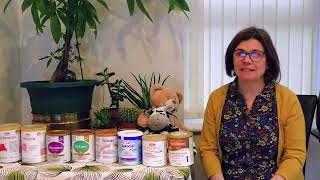Milk and soya free diets for babies
All standard infant formula (eg SMA, Comfort milk, Cow & Gate, Aptamil) contains cow’s milk protein.


Formula feeding a baby with cow's milk protein allergy (video 4) Milk free weaning for babies with cow’s milk protein allergy (video 5)
Why a milk and soya free diet?
Around 3% of children develop non-IgE Cow’s Milk Protein Allergy. Some children who are allergic to cow's milk protein are also allergic to soya protein so this may need to be excluded from the diet too. This information will help you avoid cow's milk protein and soya protein whilst making sure your baby gets all the nutrition they need to grow and develop
Cow's milk allergy in children | Health topics A to Z | CKS | NICE
Which milks should be excluded?
Avoidance needs to include fresh, UHT, sterilised and dried cow’s milk and soya milk options. The diet should be free of cow's milk protein (casein and whey), soya protein and milk sugar (lactose). Other mammalian milks are not suitable alternatives to cow's milk as their protein structure is similar and may still cause an allergic response -do not use milks such as goats, sheep, camel and buffalo milk.
Replacing cow's milk and soya
Cow’s Milk is an important source of nutrition for babies and children. If you breast feed your baby, continue to breast feed your little one, while following a milk and soya free diet. If your baby is taking an infant formula, it needs to be a milk/soya free formula.
Important to remember- Occasionally, breast fed babies can react to milk proteins/soya proteins transferred in breast milk from the mother’s diet. It is important to remember that if your baby does not have any symptoms on breast feed, you can continue on normal diet without restrictions
Suitable infant formula free of cow's milk and soya proteins
Your baby may have been prescribed a formula such a Alimentum, Althera, Nutramigen LGG, Aptamil Pepti (or more rarely Alfamino, Puramino, Neocate or Elecare). They should continue this until 12 months or as advised by your Health Care Professional.
Most babies aged 6-12 months need approximately 600ml (20oz) each day to ensure they are meeting their nutritional needs, especially calcium.
Over 1 year this amount reduces to approximately 350ml (12oz). Check with your Health Visitor or Dietitian if you have concerns about your child’s calcium needs.
Other alternatives to cow's milk and soya milk for cooking
Alternatives to milk that are fortified with calcium are available to buy from most supermarkets. They can be used in cooking from six months of age or as a main drink after one year old.
Examples include:
- Nut milk alternatives (almond, coconut, cashew, hazelnut),
- Oat milk
- Hemp, pea, coconut milk
Rice milk should not be given to children under four and half years old.
Always choose a milk alternative that is fortified or enriched with calcium - they should provide at least 120 mg of calcium/100mls. Organic versions do not usually have calcium added - check the label.
Foods to avoid
Look for the list of ingredients printed on the package and avoid foods which have 'milk' and/or 'soya' in bold on the label. When eating out, food outlets need to provide you with allergy information by law, so always ask.
Check with your pharmacist about tablets or medicines which may contain milk or soya proteins and/or lactose.
Introducing solids (weaning)
Starting solids for a baby who has non-IgE cow's milk and soya protein allergy should be the same as for a non-allergic baby, however you must not give any foods that contain cow's milk or soya products. Aim to start around six months, but not before four months (17 weeks). For general information on introducing solids, check the NHS choice website page - your baby's first solid foods - NHS (www.nhs.uk)
Adapting recipes
Many recipes can be adapted by using your chosen supermarket milk alternative. Use a milk and soya free margarine instead of butter and milk alternatives in place of milk. Try making up batches of milk and soya free meals/puddings and freezing them
Calcium and Vitamin D
For further information please see our what about calcium section on milk free diet for babies for further information regarding calcium and vitamin D.
Back to Is it cow's milk allergy page


